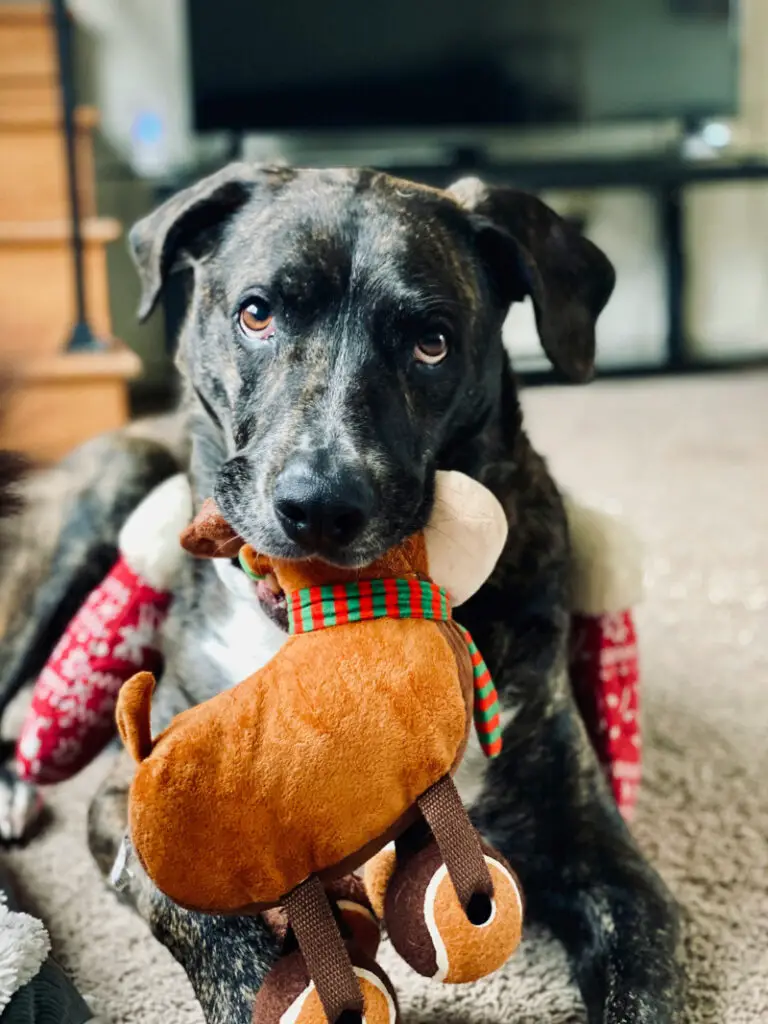Does your dog constantly cough as if choking? He may have caught a kennel cough. Although this can be quite alarming, most of the time it does not become a serious condition.
Keep reading to know the symptoms, the form of contagion, available treatments, care, and frequently asked questions about dog kennel cough.
Table of Contents
What is dog kennel cough and what causes it?
Kennel cough, also called canine infectious tracheobronchitis, is a highly contagious respiratory condition in dogs. It is usually transmitted when a healthy dog is exposed to the saliva and nasal secretions of an infected dog. It is characterized by a dry and constant cough, caused by inflammation of the bronchioles and trachea.
Such a cough can sound like the dog has something stuck in its throat.
Kennel cough can be caused by multiple microorganisms, including Bordetella bronchiseptica bacteria, canine adenovirus, distemper virus, parainfluenza virus, and mycoplasma, among others.
How do I know if my dog has kennel cough?
The classic symptom of kennel cough is a hacking, hacking cough. Many describe it as the dog having something stuck in its throat, or as a sound similar to the quacking of a goose. Sometimes the cough can be productive, in which case it is followed by Agag, swallowing motion, and finally the expulsion of phlegm/mucus.
It should be noted that this cough should not be confused with a particular sound that some dogs make, called a “reverse sneeze.”
In general, these are all the symptoms that a dog with kennel cough may display :
- Dry, constant cough, which often gets worse at night
- Arcades with phlegm production (white foam)
- Sneezing
- Nasal and/or ocular discharge
- Lethargy
- Loss of appetite
- Fever
- Difficulty breathing
Note. Be warned that the canine distemper virus and canine influenza virus start with symptoms almost identical to kennel cough. Other conditions that can cause a cough include a collapsing trachea, bronchitis, asthma, and even heart disease.
Kennel cough causes mild to moderate symptoms in most infected dogs but can become complicated and progress to life-threatening pneumonia in some cases.
How is this disease diagnosed?
There is no single test to diagnose kennel cough. Generally, if the dog has the characteristic symptoms and has been exposed to other canines in the approximate incubation period, a diagnosis of kennel cough can be made.
Commonly, discharge samples are taken to determine which specific virus or bacteria is causing the infection. If complications are suspected, X-rays may be performed to assess the dog’s general condition.
How is kennel cough spread?
A healthy dog can get kennel cough by inhaling certain bacteria or virus particles. This can occur through coughing, sneezing, and contact with contaminated objects, such as toys, necklaces, food/water bowls, or other shared items.
Dogs are often exposed to the disease when they are in areas that are crowded, overcrowded, or have poor airflow. For example:
- Animal shelters
- Dog daycare
- Grooming and hairdressing facilities
- Dog parks
It is said that the canine respiratory system is designed to protect itself from infections, but certain factors and conditions make them more vulnerable to this type of disease. This includes stress (travel, crowding), constant exposure to dust or cigarette smoke, cold temperatures, and poor ventilation.
What is the incubation period?
Kennel cough has an incubation period of 2 to 14 days, during which time the dog is already contagious. Some dogs can be carriers for months without showing symptoms.
The condition can start to manifest as early as 3-4 days after exposure.
How is kennel cough cured in dogs?
Treatment for kennel cough depends on the individual dog and the severity of the illness.
For mild cases, treatment only includes supportive care, which focuses on rest, nutrition, and hydration. The vet may also prescribe antibiotics to speed recovery and a cough suppressant to reduce the frequency of coughing. The dog usually heals within 1 to 2 weeks.
It is worth noting that some dogs can fully recover on their own without the need for treatment.
In contrast, when kennel cough is severe and has progressed to pneumonia, the dog needs hospitalization and medical treatment. In cases like this, the pet will most likely have a severe cough, act lethargic, and not want to eat or drink. Your treatment may include:
- Intravenous fluids
- Antibiotics
- Anti-inflammatories
- Oxygen therapy
The antibiotics of choice to treat kennel cough are doxycycline, amoxicillin, and azithromycin. As an anti-inflammatory agent, prednisolone is usually administered.
How long does it last?
As an owner, one of the most common doubts is: “how long does kennel cough last”.
The vast majority of infected dogs recover completely within 3 weeks; however, it can last up to 6 weeks in puppies, very old dogs, or dogs with pre-existing health problems. In severe cases, the condition can become chronic and progress to pneumonia.
Be sure to see your vet if your dog doesn’t seem to heal in the expected amount of time.
The specific germs that cause canine infectious tracheobronchitis can also influence how long it lasts.
What care should a dog with kennel cough receive?
While the dog is at home recovering, it is recommended:
- Keep it in a well-humidified area as well as a stress-free environment.
- Prevent the pet from coming into contact with household cleaners, cigarette smoke, dust, or other irritants that can worsen its condition.
- Encourage him to drink fluids throughout the day, either sip of warm water or chicken broth.
- Instead of a collar, wear a harness during walks outside. By not putting pressure on the trachea, the headgear helps prevent coughing from getting worse.
- Prevent the dog from getting agitated. Arousal can further irritate the airways.
- Pay attention to the symptoms and consult the veterinarian if the condition worsens.
How can contagion be prevented?
The main form of prevention against kennel cough is vaccination. Currently, there is a vaccine against Bordetella bacteria, the pathogen responsible for most cases. For example, dogs that are frequently approached by other dogs, go to daycare, or compete in dog sports, may benefit from this vaccine.
The kennel cough vaccine is available in oral, intranasal, and injectable forms. Depending on the formulation, it can be given in two initial doses 2-4 weeks apart, followed by a booster dose every 6 months to 1 year.
Taking into account that some cases of canine infectious tracheobronchitis are not caused by Bordetella bacteria, it should be noted that the vaccine is not effective 100% of the time. There is still the possibility of contagion.
It is important to isolate any dog suspected of having kennel cough. Infected dogs can infect other healthy dogs for several weeks.




